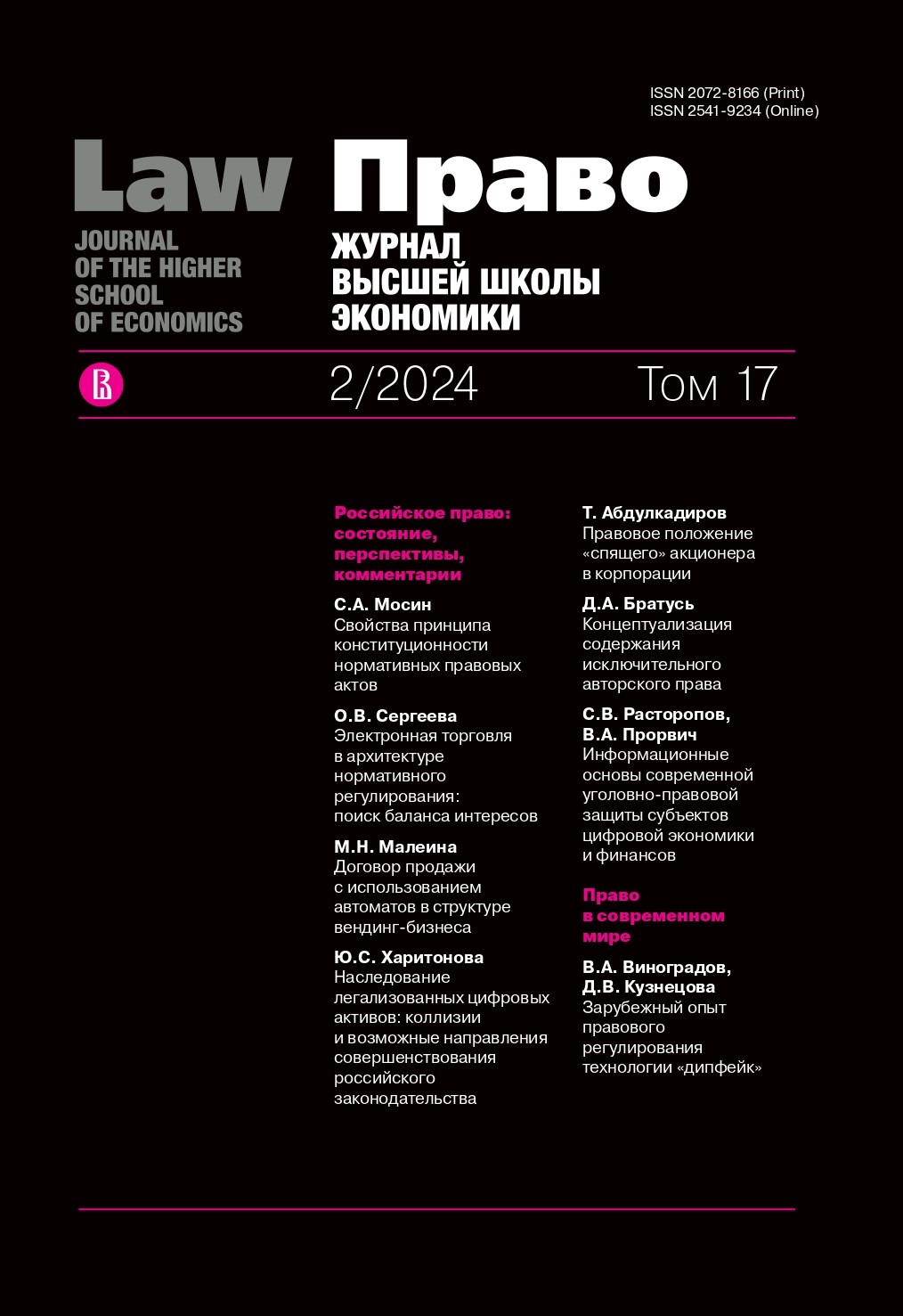Правовое положение «спящего» акционера в корпорации
Аннотация
Актуальность темы статьи обусловлена обсуждениями в течение последних 20 лет проблем правового статуса «простаивающих» акционеров, которые бездействием создают препятствия нормальной хозяйственной деятельности акционерного общества. За последние пять лет кардинально изменилась правовая позиция Верховного Суда Российской Федерации по рассмотрению требований о признании акций бесхозяйными. Арбитражными судами предпринимаются попытки сформировать единообразие судебной практики по распределению бремени доказывания в корпоративных спорах, предметом которых является определение принадлежности акций отсутствующих акционеров. Исключенные акционеры в принудительном внесудебном порядке начинают добиваться искоренения спорной и неразумной практики Высшего Арбитражного Суда Российской Федерации, оправдывающего выбытие акционеров, не согласных или не заинтересованных в преобразовании акционерного общества в организационно-правовую форму общества с ограниченной ответственностью (ООО). Для определения обстоятельств, устанавливаемых судами по искам о признании акций бесхозяйными, а также формы защиты прав корпорации автором проведено буквальное и систематическое толкование правовых норм, а также проанализирована судебно-арбитражная практика. В последние несколько лет органами исполнительной власти и надзорными органами предпринимаются попытки по регламентации правового статуса спящего акционера. Также предпринимаются усилия в части обеспечения интересов акционерных обществ без нарушения прав акционеров, что обещает соблюдение баланса интересов сторон корпоративных правоотношений и равенства общества и его участников. В статье дан анализ терминологии «спящий акционер», «потерянный акционер», «мертвые души» и установлено юридическое значение перечисленных словосочетаний. Определены критерии признания акций бесхозяйными, которые вытекают из длительного бездействия акционера, выражающегося в неполучении дивидендов и корреспонденции на протяжении более 5 лет. Предложено разрешить выкуп спорных ценных бумаг у потерянных акционеров и путем внесения изменения в законодательство об акционерных обществах обязать корпорацию формировать фонд невыплаченных дивидендов в пользу «спящих» акционеров, определить его статус и сроки реализации возможности получения такими акционерами не выплаченных им ранее денежных средств.
Литература
Baibekova E.F. (2021) “Dead souls” in a joint stock company. Pravovaya paragigma=Legal Paradigm, no. 2, pp. 143-149 (in Russ.) DOI: https://doi.org/10.15688/lc.jvolsu.2021.2.19
Besedin A.N. (2014) Corporate relations: a study in theory and regulation. Moscow: Norma, 144 p. (in Russ.)
Biryukov D.O. (2020) In do-minor: requiem for minority in a major key tone. Moscow: Statut, 300 p. (in Russ.)
Bratus S.N. (1947) Legal entities in Soviet civil law. Moscow: Jurizdat, 364 p. (in Russ.)
Dolinskaya V.V., Faleev V.V. (2009) Minority shareholders: concept and general characteristics of the situation. Tcivilist=Civilist, no. 4, pp. 77-87.
Ershova I.V. (2023) Issues of business law: textbook. Moscow: Prospekt, 448 p. (in Russ.)
Filippova S. Yu., Shitkina I.S. (2019) Sale or acquisition of a business: legal support of a transaction. Moscow: Statut, 191 p. (in Russ.)
Glushetsky A.A. (2017) Open and closed corporations: legal and economic aspects. Moscow: Statut, 192 p.
Gutnikov O.V. (2021) Modern corporate law: issues of theory and practice. Moscow: Statut, 528 p (in Russ)
Ioffe O.S. (1961) Issues of legal theory. Moscow: Jurizdat, 381 p. (in Russ.)
Laptev V.A. (2019) Corporate law: legal organization of corporate systems. Moscow: Prospekt, 384 p. (in Russ.) DOI: https://doi.org/10.31085/9785392284238-2019-384
Mikryukov V.A. (2015) Is it possible to get rid of “sleeping” and “lost” shareholders using transformation procedure? Zakonodatelstvo i ekonomika=Legislation and Economics, no. 9, pp. 23-29 (in Russ.)
Osipenko O.V. (2007) Conflicts within bodies of joint stock companies. Moscow: Statut, 621 p. (in Russ.)
Shitkina I.S. (2015) Corporate law: textbook. Moscow: Knorus,1080 p. (in Russ.)
Stepanov D.I. (2014) New provisions of the Civil Code on legal entities. Zakon=Law, no. 7, pp. 31-55 (in Russ.)


















